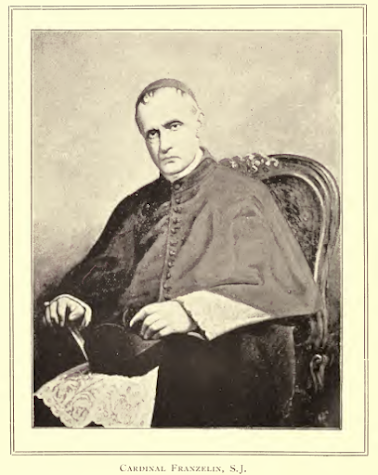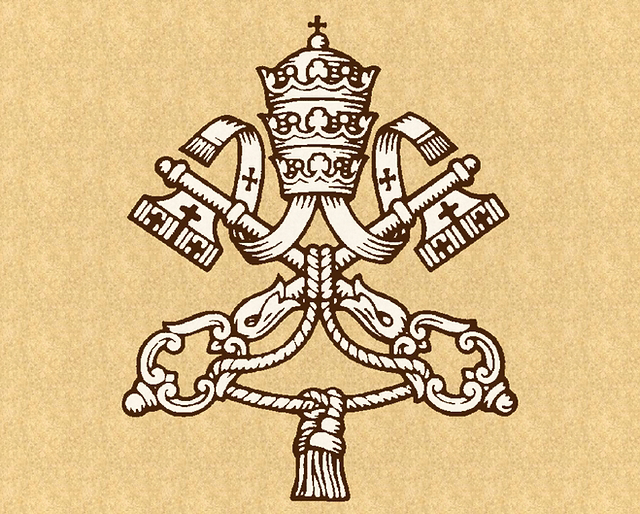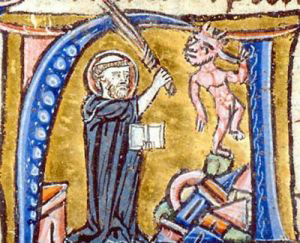Advice for Vocational Discernment from Cardinal John Baptist Franzelin (1816-1886)
ADVICE FOR VOCATIONAL DISCERNMENT FROM CARDINAL JOHN BAPTIST FRANZELIN (1816-1886)
 |
| Cardinal Franzelin, S.J. - a portrait taken from the beginning of the biography. |
The below excerpt is from the biography of John Baptist Cardinal Franzelin (1816-1886) written by Fr. Nicholas Walsh published in 1895.
A vocation to the religious state is, after all, a very simple matter, and easily discoverable, if we take our Lord's view of it and use the means settled by Him. He gives us His view in that sad and touching interview He had with " the young man of large possessions." As we have it recorded in the Gospel of St. Matthew, our Lord first told him that if he wished to enter into life, he should keep the commandments. The youth having at once answered that he had done so from his earliest years, and then asked what was yet wanting to him, our Lord replied, If you wish to be perfect, go sell all you have, give to the poor, and come, follow Me."
Our Lord places a vocation in two things first, the wish, inclination, desire to be a religious, begotten sometimes of a conviction that I ought to embrace this state ; and secondly, that I have it in me with God's grace to make the necessary sacrifice and to be true to its obligations. A man of great experience and authority Father E. O Reilly, S.J. used to say that a vocation consisted in two things: a wish for the state, and physical and mental capabilities equal to it. We can and shall become fairly certain on these points, if, having no wish but the will of God, we pray for light to know and strength to do, study ourselves under Gods guidance, seeking help from those gifted and graced by Him to give it. At the same time, we should bear in mind that God, the great Father of all, calls thousands to live in the world, and may take as great an interest in these His children, if they rightly seek His face, as He does in those called to religion. Marriages, as well as vocations, are made in heaven by God for those who desire only His holy will and use the means to know and follow it. It may not be out of place to give the mind and teaching of St. Ignatius on this subject, as he made it a special study, laid down" rules of election" which, when rightly observed, can scarcely fail in their purpose, and intended that the spiritual exercises should be given with a view to the settling of this question. The 4th of his " rules for thinking with the Church " is, " to praise greatly religious orders and a life of virginity and continence, and not to praise the married state as much as these." It would be too much to give the whole of his note headed " Prelude for making the election," but the following is its substance : In every good election, as far as regards ourselves, the eye of our intention ought to be single, looking only to the end for which I was created, which is for the praise of God our Lord and for the salvation of my soul. And thus, whatever I choose ought to be for this, that it should help me to the end for which I was created, not ordering or drawing the end to the means, but the means to the end. I should not therefore first determine to become a priest or a religious, or to marry, and as such to save my soul, but first to resolve to save my soul, and then find out in which of those states I am most likely and best fitted to do so." The 15th of the" Annotations for the help of him who is to give and of him who is to receive the Spiritual Exercises" is as follows: " He who gives the exercises must not incline him who receives them more to poverty or a vow than to their contraries, nor to one state or manner of life than to another; for although outside the exercises we may lawfully and meritoriously induce all who may in all probability be disposed to it to choose a life of continency, virginity, a life in religion, or any kind of evangelical perfection, nevertheless, during the time of the Spiritual Exercises, when the soul is seeking the Divine will, it is better and more fitting that its Creator and Lord Himself communicate with the devout soul, disposing it for that way of life which will best suit it for the future." This simple and straight direction of St. Ignatius should destroy an idea which some seem to have, that the Spiritual Exercises were intended to catch all for the religious state, and, if possible, for his own order.
Cardinal Franzelin, S.J. - A Sketch and Study. Reverend Nicholas Walsh, S.J. Published by M.H. Gill and Son. Dublin, 1895, p. 33-36
Link to a PDF document of the biography available online for free:
https://ia804704.us.archive.org/11/items/johnbaptistfranz00walsuoft/johnbaptistfranz00walsuoft.pdf


Comments
Post a Comment